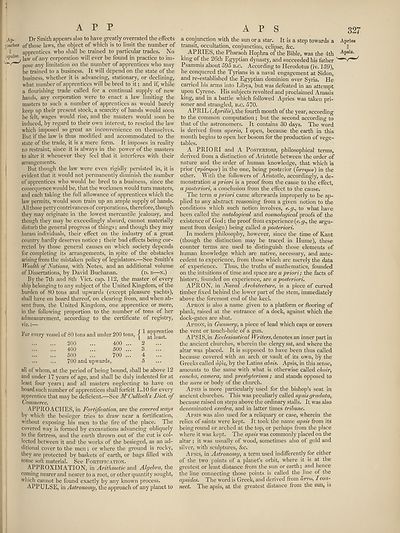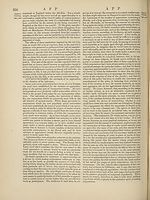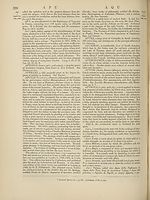Encyclopaedia Britannica > Volume 3, Anatomy-Astronomy
(335) Page 327
Download files
Complete book:
Individual page:
Thumbnail gallery: Grid view | List view

i
*
A P P
Ap- Dr Smith appears also to have greatly overrated the effects
j jaches 0f those laws, the object of which is to limit the number of
II apprentices who shall be trained to particular trades. No
. >pulse^ jaw 0pany corporation will ever be found in practice to im-
p0se any limitation on the number of apprentices who may
be trained to a business. It will depend on the state of the
business, whether it is advancing, stationary, or declining,
what number of apprentices will be bred to it; and if, while
a flourishing trade called for a continual supply of new
hands, any corporation were to enact a law limiting the
masters to such a number of apprentices as would barely
keep up their present stock, a scarcity of hands would soon
be felt, wages would rise, and the masters would soon be
induced, by regard to their own interest, to rescind the law
which imposed so great an inconvenience on themselves.
But if the law is thus modified and accommodated to the
state of the trade, it is a mere form. It imposes in reality
no restraint, since it is always in the power of the masters
to alter it whenever they feel that it interferes with their
arrangements.
But though the law were even rigidly persisted in, it is
evident that it would not permanently diminish the number
of apprentices who would be bred to a business, since the
consecpience would be, that the workmen would turn masters,
and each taking the full allowance of apprentices which the
law permits, would soon train up an ample supply of hands.
All those petty contrivances of corporations, therefore, though
they may originate in the lowest mercantile jealousy, and
though they may be exceedingly absurd, cannot materially
disturb the general progress of things; and though they may
harass individuals, their effect on the industry of a great
country hardly deserves notice ; their bad effects being cor¬
rected by those general causes on which society depends
for completing its arrangements, in spite of the obstacles
arising from the mistaken policy of legislators.—See Smith’s
Wealth of Nations, with Notes, and an additional volume
of Dissertations, by David Buchanan. (d. b—n.)
By the 7th and 8th Viet. cap. 112, the master of every
ship belonging to any subject of the United Kingdom, of the
burden of 80 tons and upwards (except pleasure yachts),
shall have on board thereof, on clearing from, and when ab¬
sent from, the United Kingdom, one apprentice or more,
in the following proportion to the number of tons of her
admeasurement, according to the certificate of registry,
viz.:—
For every vessel of 80 tons and under 200 tons,
200 ... 400 ...
400 ... 500 ...
500 ... 700 ...
... ... 700 and upwards,
1 apprentice
at least.
2
3
4
5
all of whom, at the period of being bound, shall be above 12
and under 17 years of age, and shall be duly indented for at
least four years; and all masters neglecting to have on
board such number of apprentices shall forfeit L.10 for every
apprentice that may be deficient.—See Culloch's Diet, of
Commerce.
APPROACHES, in Fortification, are the covered ways
by which the besieger tries to draw near a fortification,
without exposing his men to the fire of the place. The
covered way is formed by excavations advancing obliquely
to the fortress, and the earth thrown out of the cut is col¬
lected between it and the w'orks of the besieged, as an ad¬
ditional cover to the men ; or where the ground is rocky,
they are protected by baskets of earth, or bags filled with
some soft material. See Fortification.
APPROXIMATION, in Arithmetic and Algebra, the
coming nearer and nearer to a root, or other quantity sought,
which cannot be found exactly by any known process.
APPULSE, in Astronomy, the approach of any planet to
APS 327
a conjunction with the sun or a star. It is a step towards a Apriea
transit, occultation, conjunction, eclipse, &c. II
APRIES, the Pharaoh Hophra of the Bible, was the 4th Apsis,
king of the 26th Egyptian dynasty, and succeeded his father
Psammis about 595 b.c. According to Herodotus (iv. 159),
he conquered the Tyrians in a naval engagement at Sidon,
and re-established the Egyptian dominion over Syria. He
carried his arms into Libya, but was defeated in an attempt
upon Gyrene. His subjects revolted and proclaimed Amasis
king, and in a battle which followed Apries was taken pri¬
soner and strangled, B.c. 570.
APRIL (Aprilis), the fourth month of the year, according
to the common computation; but the second according to
that of the astronomers. It contains 30 days. The word
is derived from aperio, I open, because the earth in this
month begins to open her bosom for the production of vege¬
tables.
A PRIORI and A Posteriori, philosophical terms,
derived from a distinction of Aristotle between the order of
nature and the order of human knowledge, that which is
prior (irpoTepov) in the one, being posterior (iVrepov) in the
other. With the followers of Aristotle, accordingly, a de¬
monstration a priori is a proof from the cause to the effect,
a posteriori, a conclusion from the effect to the cause.
The term a priori came afterwards improperly to be ap¬
plied to any abstract reasoning from a given notion to the
conditions which such notion involves, e.g., to what have
been called the ontological and cosmological proofs of the
existence of God; the proof from experience^. <?., the argu¬
ment from design) being called a posteriori.
In modern philosophy, however, since the time of Kant
(though the distinction may be traced in Hume), these
counter terms are used to distinguish those elements of
human knowledge which are native, necessary, and ante¬
cedent to experience, from those which are merely the data
of experience. Thus, the truths of mathematics, founded
on the intuitions of time and space are a priori; the facts of
history, founded on experience, are a posteriori.
APRON, in Naval Architecture, is a piece of curved
timber fixed behind the lower part of the stem, immediately
above the foremost end of the keel.
Apron is also a name given to a platform or flooring of
plank, raised at the entrance of a dock, against which the
dock-gates are shut.
Apron, in Gunnery, a piece of lead which caps or covers
the vent or touch-hole of a gun.
APSIS, in Ecclesiastical Writers, denotes an inner part in
the ancient churches, wherein the clergy sat, and where the
altar was placed. It is supposed to have been thus called
because covered with an arch or vault of its own, by the
Greeks called by the Latins absis. Apsis, in this sense,
amounts to the same with what is otherwise called choir,
concha, camera, and presbyterium ; and stands opposed to
the nave or body of the church.
Apsis is more particularly used for the bishop’s seat in
ancient churches. This was peculiarly called apsis gradata,
because raised on steps above the ordinary stalls. It was also
denominated exedra, and in latter times tribune.
Apsis was also used for a reliquary or case, wherein the
relics of saints were kept. It took the name apsis from its
being round or arched at the top, or perhaps from the place
where it was kept. The apsis was commonly placed on the
altar ; it was usually of wood, sometimes also of gold and
silver, with sculptures, &c.
Apsis, in Astronomy, a term used indifferently for either
of the two points of a planet’s orbit, where it is at the
greatest or least distance from the sun or earth; and hence
the line connecting those points is called the J’116 ^ie
apsides. The word is Greek, and derived from aTrro), I con¬
nect. The apsis, at the greatest distance from the sun, is
*
A P P
Ap- Dr Smith appears also to have greatly overrated the effects
j jaches 0f those laws, the object of which is to limit the number of
II apprentices who shall be trained to particular trades. No
. >pulse^ jaw 0pany corporation will ever be found in practice to im-
p0se any limitation on the number of apprentices who may
be trained to a business. It will depend on the state of the
business, whether it is advancing, stationary, or declining,
what number of apprentices will be bred to it; and if, while
a flourishing trade called for a continual supply of new
hands, any corporation were to enact a law limiting the
masters to such a number of apprentices as would barely
keep up their present stock, a scarcity of hands would soon
be felt, wages would rise, and the masters would soon be
induced, by regard to their own interest, to rescind the law
which imposed so great an inconvenience on themselves.
But if the law is thus modified and accommodated to the
state of the trade, it is a mere form. It imposes in reality
no restraint, since it is always in the power of the masters
to alter it whenever they feel that it interferes with their
arrangements.
But though the law were even rigidly persisted in, it is
evident that it would not permanently diminish the number
of apprentices who would be bred to a business, since the
consecpience would be, that the workmen would turn masters,
and each taking the full allowance of apprentices which the
law permits, would soon train up an ample supply of hands.
All those petty contrivances of corporations, therefore, though
they may originate in the lowest mercantile jealousy, and
though they may be exceedingly absurd, cannot materially
disturb the general progress of things; and though they may
harass individuals, their effect on the industry of a great
country hardly deserves notice ; their bad effects being cor¬
rected by those general causes on which society depends
for completing its arrangements, in spite of the obstacles
arising from the mistaken policy of legislators.—See Smith’s
Wealth of Nations, with Notes, and an additional volume
of Dissertations, by David Buchanan. (d. b—n.)
By the 7th and 8th Viet. cap. 112, the master of every
ship belonging to any subject of the United Kingdom, of the
burden of 80 tons and upwards (except pleasure yachts),
shall have on board thereof, on clearing from, and when ab¬
sent from, the United Kingdom, one apprentice or more,
in the following proportion to the number of tons of her
admeasurement, according to the certificate of registry,
viz.:—
For every vessel of 80 tons and under 200 tons,
200 ... 400 ...
400 ... 500 ...
500 ... 700 ...
... ... 700 and upwards,
1 apprentice
at least.
2
3
4
5
all of whom, at the period of being bound, shall be above 12
and under 17 years of age, and shall be duly indented for at
least four years; and all masters neglecting to have on
board such number of apprentices shall forfeit L.10 for every
apprentice that may be deficient.—See Culloch's Diet, of
Commerce.
APPROACHES, in Fortification, are the covered ways
by which the besieger tries to draw near a fortification,
without exposing his men to the fire of the place. The
covered way is formed by excavations advancing obliquely
to the fortress, and the earth thrown out of the cut is col¬
lected between it and the w'orks of the besieged, as an ad¬
ditional cover to the men ; or where the ground is rocky,
they are protected by baskets of earth, or bags filled with
some soft material. See Fortification.
APPROXIMATION, in Arithmetic and Algebra, the
coming nearer and nearer to a root, or other quantity sought,
which cannot be found exactly by any known process.
APPULSE, in Astronomy, the approach of any planet to
APS 327
a conjunction with the sun or a star. It is a step towards a Apriea
transit, occultation, conjunction, eclipse, &c. II
APRIES, the Pharaoh Hophra of the Bible, was the 4th Apsis,
king of the 26th Egyptian dynasty, and succeeded his father
Psammis about 595 b.c. According to Herodotus (iv. 159),
he conquered the Tyrians in a naval engagement at Sidon,
and re-established the Egyptian dominion over Syria. He
carried his arms into Libya, but was defeated in an attempt
upon Gyrene. His subjects revolted and proclaimed Amasis
king, and in a battle which followed Apries was taken pri¬
soner and strangled, B.c. 570.
APRIL (Aprilis), the fourth month of the year, according
to the common computation; but the second according to
that of the astronomers. It contains 30 days. The word
is derived from aperio, I open, because the earth in this
month begins to open her bosom for the production of vege¬
tables.
A PRIORI and A Posteriori, philosophical terms,
derived from a distinction of Aristotle between the order of
nature and the order of human knowledge, that which is
prior (irpoTepov) in the one, being posterior (iVrepov) in the
other. With the followers of Aristotle, accordingly, a de¬
monstration a priori is a proof from the cause to the effect,
a posteriori, a conclusion from the effect to the cause.
The term a priori came afterwards improperly to be ap¬
plied to any abstract reasoning from a given notion to the
conditions which such notion involves, e.g., to what have
been called the ontological and cosmological proofs of the
existence of God; the proof from experience^. <?., the argu¬
ment from design) being called a posteriori.
In modern philosophy, however, since the time of Kant
(though the distinction may be traced in Hume), these
counter terms are used to distinguish those elements of
human knowledge which are native, necessary, and ante¬
cedent to experience, from those which are merely the data
of experience. Thus, the truths of mathematics, founded
on the intuitions of time and space are a priori; the facts of
history, founded on experience, are a posteriori.
APRON, in Naval Architecture, is a piece of curved
timber fixed behind the lower part of the stem, immediately
above the foremost end of the keel.
Apron is also a name given to a platform or flooring of
plank, raised at the entrance of a dock, against which the
dock-gates are shut.
Apron, in Gunnery, a piece of lead which caps or covers
the vent or touch-hole of a gun.
APSIS, in Ecclesiastical Writers, denotes an inner part in
the ancient churches, wherein the clergy sat, and where the
altar was placed. It is supposed to have been thus called
because covered with an arch or vault of its own, by the
Greeks called by the Latins absis. Apsis, in this sense,
amounts to the same with what is otherwise called choir,
concha, camera, and presbyterium ; and stands opposed to
the nave or body of the church.
Apsis is more particularly used for the bishop’s seat in
ancient churches. This was peculiarly called apsis gradata,
because raised on steps above the ordinary stalls. It was also
denominated exedra, and in latter times tribune.
Apsis was also used for a reliquary or case, wherein the
relics of saints were kept. It took the name apsis from its
being round or arched at the top, or perhaps from the place
where it was kept. The apsis was commonly placed on the
altar ; it was usually of wood, sometimes also of gold and
silver, with sculptures, &c.
Apsis, in Astronomy, a term used indifferently for either
of the two points of a planet’s orbit, where it is at the
greatest or least distance from the sun or earth; and hence
the line connecting those points is called the J’116 ^ie
apsides. The word is Greek, and derived from aTrro), I con¬
nect. The apsis, at the greatest distance from the sun, is
Set display mode to:
![]() Universal Viewer |
Universal Viewer | ![]() Mirador |
Large image | Transcription
Mirador |
Large image | Transcription
Images and transcriptions on this page, including medium image downloads, may be used under the Creative Commons Attribution 4.0 International Licence unless otherwise stated. ![]()
| Encyclopaedia Britannica > Encyclopaedia Britannica > Volume 3, Anatomy-Astronomy > (335) Page 327 |
|---|
| Permanent URL | https://digital.nls.uk/193761703 |
|---|
| Attribution and copyright: |
|
|---|---|
| Shelfmark | EB.16 |
|---|---|
| Description | Ten editions of 'Encyclopaedia Britannica', issued from 1768-1903, in 231 volumes. Originally issued in 100 weekly parts (3 volumes) between 1768 and 1771 by publishers: Colin Macfarquhar and Andrew Bell (Edinburgh); editor: William Smellie: engraver: Andrew Bell. Expanded editions in the 19th century featured more volumes and contributions from leading experts in their fields. Managed and published in Edinburgh up to the 9th edition (25 volumes, from 1875-1889); the 10th edition (1902-1903) re-issued the 9th edition, with 11 supplementary volumes. |
|---|---|
| Additional NLS resources: |
|

